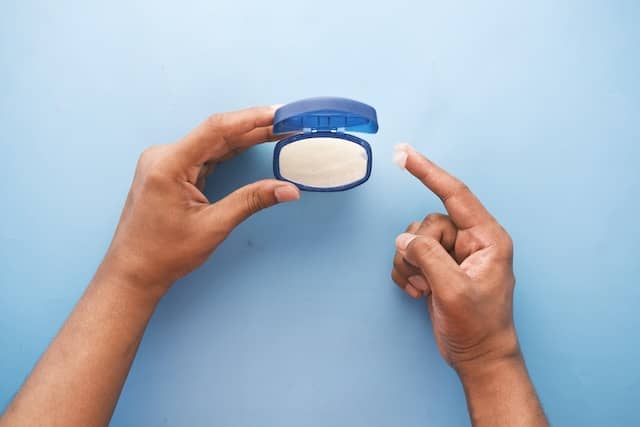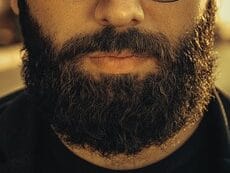We don’t need an introduction to know Vaseline or petroleum jelly. We have been using it for treating dry skin, chapped lips, minor cuts, scrapes, and burns. But the question is, does Vaseline help beard growth?
Petroleum jelly or Vaseline on the beard is an intense moisturizer for treating dry skin underneath or frizzy beards, but no study claims Vaseline helps beard growth. Factors like genetics, hormones, primarily testosterone, diet, exercise, lifestyle, and proper grooming habits play a vital role in beard growth.
Vaseline for moisturizing a beard is a cheap alternative but has some cons. It can clog pores or give your beard a heavy feel.
It would be better to choose natural oils like argan oil for beards, jojoba oil for beards, olive oil for beard growth, or other natural remedies.
Table of Contents
Does Vaseline help beard growth?

No vaseline does not help in stimulating beard growth.
Vaseline or petroleum jelly is composed primarily of mineral oil (like baby oil) and waxes that can only help to moisturize, soothe, soften dry skin, or heal cuts, wounds, burns, or chapped lips.
Petroleum jelly is a semi-solid mixture of hydrocarbons derived from petroleum and then purified to remove impurities and form a clear, odorless, and jelly-like substance.
It has emollient properties, prevent moisture loss by forming a protective barrier on the skin surface, and helps to retain the skin’s natural moisture.
You can use Vaseline on beards after applying beard oil or any other carrier oil for the beard to lock moisture for hours.
Can I use Vaseline on my beard?

Yes, you can use Vaseline on your beard, but it’s crucial to understand its potential benefits and limitations.
Using Vaseline on your beard can help moisturize and hydrate the beard and underlying skin.
Dry skin can often lead to itchiness, flakiness, and discomfort, and applying a thin layer of petroleum jelly can help relieve these issues.
Vaseline forms a barrier between beards and environmental factors like cold weather and wind. It prevents them from getting dry and rough.
It is crucial to be aware that Vaseline is a dense, occlusive substance that has the potential to feel greasy and impart a shiny appearance to your beard.
Some people may not prefer this texture or look, be mindful not to apply too much, a little goes a long way, and you don’t want to make your beard excessively greasy.
Apply a thin layer and massage it into the skin beneath the beard. It can help prevent dryness and itchiness.
Moreover, excessive use of Vaseline can potentially clog hair follicles and hinder beard hair growth.
Alternatively, some specific beard oils, balms, and moisturizers available in the market are formulated specifically for beard care.
These products often contain a combination of natural oils and ingredients that can provide similar moisturizing benefits without the heavy texture of Vaseline.
They are typically designed to be beard-friendly, offering hydration, conditioning, and sometimes even fragrance.
Ultimately, choosing between Vaseline or dedicated beard care products is a matter of personal preference. Consider experimenting with different products to find what works best for you and keeps your beard and skin in good condition.
Is Vaseline good for beard dandruff?
Beard dandruff or beardruff happens due to dry skin or seborrheic dermatitis. Vaseline has a moisture-holding capacity and can moisturize skin, but it may not be the most effective solution.

By using Vaseline or petroleum jelly, you may get temporary relief. It may not address the root cause of the problem.
There are several natural options for beard dandruff treatment that you can opt for instead of Petroleum jelly on beards, as they are made especially for treating beard problems.
You can use tea tree oil for beard dandruff. It has antibacterial, antiviral, antifungal, anti-inflammatory, and insecticidal properties, making it suitable for medicinal and therapeutic treatment.
You can also opt for beard oils or balms containing ingredients like jojoba and argan oil, which can help nourish the skin and hair, reduce dryness, and alleviate beard dandruff.
In addition, you have to take care of your beard care routine to reduce beard dandruff.
Cleanse your face or beard with beard soap or mild beard shampoos made specially to treat dandruff.
Avoid harsh chemical-based shampoos or beard wash that may strip away natural oils.
You can also gently exfoliate the skin beneath by brushing your beard using a soft brush or a beard scrub to remove dead skin cells and promote healthier skin.
If your beard dandruff persists or becomes severe, it’s advisable to consult with a dermatologist who can provide a proper diagnosis and recommend suitable treatment options.
How is Vaseline good for beards and mustaches?
Vaseline, a petroleum jelly brand, is known for its moisturizing and protective properties, leading to its versatile use.
While it offers some benefits for the skin, it may not be ideal for beards and mustaches. Here are some key points to consider:
- Moisturization: Vaseline can moisturize the skin beneath facial hair. Applying a small amount can help prevent dryness and flakiness, common issues in beard and mustache areas.
- Softening: Vaseline might help soften beard and mustache hair, making it more manageable and less prone to tangling. It can be particularly beneficial for individuals with coarse or wiry facial hair.
- Protection: Vaseline can shield the skin and facial hair from external elements like harsh weather conditions and pollutants.
However, it’s important to note that Vaseline is a heavy and greasy product. It can leave an oily residue on the beard and mustache, which may not be desirable for everyone.
Additionally, using Vaseline on facial hair could clog the hair follicles or cause build-up over time.
If you’re seeking specific products for beard and mustache care, numerous options are available specifically designed to cater to the unique needs of facial hair.
These products have natural oils such as jojoba, argan, or coconut oil, which can nourish the hair and skin underneath without the greasy sensation associated with Vaseline.
Consider personal preferences and consult a dermatologist or grooming specialist for personalized advice on maintaining a healthy and well-groomed beard or mustache.
Side effects of using Vaseline on beards:

While Vaseline can offer certain advantages for the skin and beard, it’s essential to be aware of potential drawbacks when using it on your facial hair.
These side effects include:
Greasiness:
Vaseline is a dense and oily substance and applying it to your beard can result in a greasy residue. It can give your beard an unappealing oily appearance and texture.
Clogged hair follicles:
Vaseline’s thick consistency can clog your hair follicles if you use it excessively or fail to cleanse it adequately.
Clogged follicles can lead to issues like ingrown hairs or folliculitis, which is the inflammation of hair follicles.
Build-up and residue:
Over time, Vaseline can accumulate in your beard, leaving behind a build-up or residue.
It can make your beard feel heavy, stiff, or sticky and may require thorough cleansing to remove.
Reduced breathability:
Vaseline forms a barrier on the skin, which can hinder the breathability of your facial hair and the underlying skin.
It can result in trapped sweat, moisture, or bacteria, potentially leading to skin irritation or fungal infections.
Dependency on external moisture:
While Vaseline can provide external moisture to your beard and skin, relying solely on it for hydration may inhibit your skin’s natural oil production.
This dependency may result in dryness when you do not use the product.
Considering these possible side effects, I recommend using specialized beard care products specifically formulated for facial hair.
These products are often lighter, less greasy, and nourish the beard and underlying skin without the disadvantages of Vaseline.
Conclusion:
It will be wrong to say that Vaseline helps beard growth. No study claims that it can stimulate healthy beard growth.
Vaseline or petroleum jelly is a blend of mineral oils and waxes derived from petroleum and then purified into an odorless, jelly-like substance.
It can only help moisturize the beard and the underlying skin, which may help temporarily treat dry skin.
It has many side effects. It can clog pores, make you feel greasy, build residue with time, and reduce breathability.
So I would recommend using a product specifically made for beards which will be lighter in texture and improve beard growth without any side effects.
However, Vaseline is a cheaper option but has more drawbacks than benefits.
Faqs:
Does Vaseline help to stop the beards from growing?
No, Vaseline cannot stop beard growth. It is a moisturizing and protective product that can be used on the skin and facial hair, but it does not impact the growth rate or prevent hair from growing.
Is Vaseline considered a Beard balm?
No, Vaseline is not typically considered a beard balm. While Vaseline can provide some moisturizing and protective benefits, it is a petroleum jelly product with a heavy and greasy texture. On the other hand, beard balms are a combination of natural oils, waxes, and other ingredients to condition, style, and nourish the beard.
Does petroleum jelly help hair to grow faster?
No scientific evidence says that petroleum jelly, such as Vaseline, promotes or accelerates hair growth. Hair growth depends on genetics and factors like overall health, nutrition, and hormonal balance. While petroleum jelly can provide a protective barrier and moisturize the scalp, it does not affect the rate or speed of hair growth.
Is Vaseline good for itchy beards?
Vaseline can provide a temporary cure for itchy beards by moisturizing the underlying skin and creating a protective barrier. However, it may not address the root cause of the itching. Using dedicated beard oils or balms containing soothing ingredients like tea tree oil or jojoba oil may be more effective in alleviating itchiness and promoting overall beard health.
Kayden is an entrepreneur, writer, hairstylist working in a professional salon. He specializes in men’s grooming. He loves to blog about beards, hairstyles, and skincare.